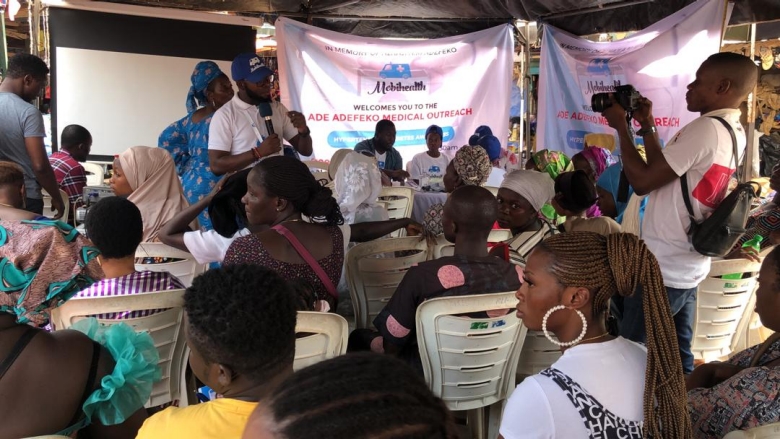Since the COVID-19 pandemic hit, the World Bank Group has taken fast action to help strengthen the global pandemic response. Projects are deploying $160 billion in financing, with support tailored to the health, economic, and social shocks countries are facing.
Funmi Adewara’s company, MobiHealth International, is one of seven winners from among 2,400 applicants to the World Bank Group’s annual SDGs&Her competition. In partnership with UNDP, UN Women, and the Wharton School Zicklin Center, the competition supports women entrepreneurs around the world, so that they can thrive in their businesses while helping achieve the Sustainable Development Goals (SDGs).
Based in Nigeria, MobiHealth International is a one-stop digital platform that gives patients access to thousands of doctors in multiple languages. Patients can use a smartphone app, call a toll-free line, or visit one of the mobile, solar-powered telehealth clinics that are on the move across Nigeria. Funmi’s business has launched a free telemedicine hotline with the Nigeria Institute of Medical Research, which has teleguided COVID-19 screening and testing to support remote communities during the pandemic.
Accessing health care screening and testing anywhere
Illness and death from communicable diseases are expected to spike during the pandemic, with service cancellations leading to a 100% increase in deaths from malaria in Sub-Saharan Africa alone. This makes the company’s work vital for supporting SDG 3, Good health and wellbeing.
“I’ve seen people dying while waiting in a queue; people asked to pay money before treatment, to go and buy blood, or to search for injections. Every 2 seconds a child in Africa dies from malaria,” said Funmi. “Around the world, unequal access to health care is contributing to premature death from noncommunicable diseases. I could have been among these statistics.”
At age 10, Funmi was rushed to a hospital with her life on the line – an experience she never forgot. It fueled her passion to create a world where everyone has access to quality health care as a basic human right. And amid COVID-19, her 100% digital medical service is paving the way for quality health care globally.
Especially because women are on the front lines of fighting the coronavirus, accounting for 70% of health care and social workers, her business supports SDG 5 on Gender equality by making testing safer. And at a time when a global recession could further squeeze development aid, her work is also directly contributing towards SDG 10 to Reduce inequality.
Taking health care to the last mile
Funmi’s company enables thousands of patients across Nigeria and beyond to sign up for real-time consultations, easing the pressure on hospitals during the pandemic. With remittances to low- and middle-income countries – an economic lifeline for many families – expected to fall further during the crisis, her platform also cuts travel costs and hospital waiting time, supporting SDG 17, Partnerships for the goals.
“We can solve 70% of all health care problems at the primary care level,” said Funmi. “And 60% of these issues can be managed through telemedicine.” The start-up’s medical portal gives access to qualified and registered doctors, nurses, and community health workers from the United Kingdom, United States, Canada, Australia, and countries in Africa.
“I became really excited about the potential of tapping cutting-edge technology to bring high-quality medical services to Africa,” explained Funmi. “With hospitals usually in urban areas, distances are far and transport is expensive. And even once patients get to hospitals, they face other challenges: long queues, lack of facilities, counterfeit drugs, few doctors.”
Yet in Nigeria, Funmi says that while 90% of people have access to mobile phones and 30% own smartphones with internet access: “I discovered that people are prepared to spend a lot on mobile phone data, yet 95% don’t have health insurance. If we can harness the power of technology, this is going to be a game changer that will help expedite universal health coverage in Africa.”
COVID-19 has only highlighted the immense potential of telemedicine, she added. “During the crisis we have adapted our business model to the reality on the ground. As an entrepreneur, you constantly have to evolve. And in the next four years, we want to take MobiHealth to 10 million people across the continent.”
About SDGs&Her:
In 2015, all 193 United Nations member countries signed on to 17 Sustainable Development Goals (SDGs) to "create the future we want in 2030.” SDGs&Her is an online competition for women entrepreneurs to showcase how they are supporting the Sustainable Development Goals (SDGs) through business leadership.

